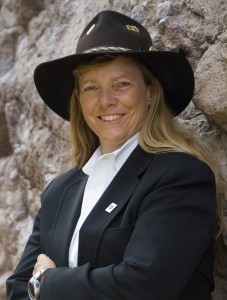 In L. Hunter Lovins’ vision of the not-too-distant future, power generation and distribution will be radically different from what we are accustomed to today.
In L. Hunter Lovins’ vision of the not-too-distant future, power generation and distribution will be radically different from what we are accustomed to today.
Lovins says the era of distributed generation is here and that central station power has no future. “An energy-rich island like Maui can become a global leader in the energy future by implementing energy efficiency, solar energy, wind, biofuels and appropriately sited geothermal,” she said.
“The utility industry of the past has very successfully extracted community wealth and shipped it abroad to buy oil, coal and other imports,” Lovins continues. “The utility of the future will be managed to generate wealth for the people of the islands. Best case, it would likely be community owned, as the utility on Eigg, in Scotland, is, but at a minimum it will be managed to keep Maui’s wealth on Maui, generating energy from local sources and paying its executives a fair local wage.
Lovins, president of the Colorado-based Natural Capitalism Solutions, is among the forward-looking speakers scheduled to address energy policy leaders at the March 26-28 conference, “Electric Utilities: The Future Is Not What It Used To Be,” at the Maui Arts & Cultural Center in Kahului.
Her nonprofit educates senior decision-makers in making the business case for a “Regenerative Economy,” and helps companies, communities and countries profit from implementing more sustainable business practices. Working in energy policy since 1972, Lovins is an international consultant, professor, speaker and author on ways to use resources more efficiently.
She cites the German utility RWE as a model of what the future holds. She said RWE has become a distributor of “diverse, distributed renewable power, meeting customer needs first through efficiency and then through aggregating a mix of renewable power generated by others. They will enable customers to gain the energy services that they want: cold beer and hot showers, not electricity produced by their power stations.”
One of the biggest paradigm shifts would affect traditional utilities, she said. “The utility industry has for too long hidden behind its regulated monopoly status, protecting its preferred answers: central power station and incumbent power structures.”
Maui is well positioned for the coming energy future, she said.
“Every region has its own best mix of renewable energy, unique customer needs,” she said. “Maui is blessed with a rich energy mix of sun, wind, growing things and volcanic energy. Where I teach in Seattle, we have a different mix. But everywhere so far studied around the inhabited world, there is ample renewable energy, if used cost-effectively (and) efficiently to meeting growing demands with efficiency and renewables. This is the only energy mix that makes sense in a world in a climate crisis, is the only affordable future, and is the future that Maui should grab with both hands, as has the island of Eigg in Scotland, or Samso in Denmark.”
